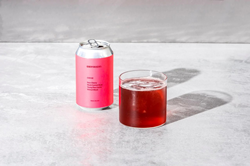“The rise of the no- and low- alcohol category may be a boon to the F&B industry in Singapore. It presents greater opportunities for socialisation between people who drink and those who don’t.
The trend is here to stay,” says Matthew Fergusson-Stewart, Managing Director, Spun Spirits.
The category of no-alcohol and low-alcohol drinks continue to outperform alcoholic beverages in its share of the total beverage market.
Commanding a 3.5% volume share of alcohol industry, the market value of no- and low-alcohol grew from USD7.8 billion in 2018 to around USD10.0 billion in 2021. Based on IWSR No- and Low-Alcohol Strategic Study, the category grew by more than +6% in volume in 2021. It is forecast that the volume will grow by +8% compound annual growth rate (CAGR) between 2021 and 2025.
According to NielsenIQ, the market for no- and low-alcohol beverages in the US alone was worth USD3.1 billion in 2021.
However, the IWSR study also found that only 5-6% of no- and low-alcohol consumers drink beverage of said category after 11pm.
“Most consumers still turn to a good beer, cocktail, wine or spirit in a bar or restaurant in Singapore, known for its density of World’s 50 Best Bars. And Michelin Star Restaurants,” says Mr Matthew Fergusson-Stewart, Managing Director, Spun Spirits, a Singapore-based bar. Spirit consulting and distribution firm. “People go out for food and drinks in Singapore. It’s in the country’s DNA. They want to have a good time. Alcohol consumption in Singapore will likely remain an on-trade and social affair. That said, the rise of the no- and low- alcohol category may be a boon to the F&B industry. It presents greater opportunities for socialisation between people who drink and those who don’t.”
The rising appetite for non- and low- alcoholic drinks has seen new and exciting products in the market.
Empirical Spirits canned cocktails for example are created by the alumni of the three Michelin Star restaurant Noma in Copenhagen. Labelled Can 01 (10% ABV), Can 02 (8% ABV) and Can 02 (4.5% ABV). These lightly carbonated drinks are blends of ingredients like oolong tea, gooseberries, sour cherry, black currant buds and walnut wood.
Riding the trend is Saicho. The new single origin sparkling tea brand is the latest in Singapore, and has already made its way into prestigious hotels, bars and restaurants in the UK and Hong Kong. Its pioneering Champagne-like teas are dubbed to promote as much nuance, flavour and provenance as premium wines.
“More people are also willing to pay top dollar for these no- and low-alcoholic beverages in a social setting. And be a part of the conversation. We have seen increasing interest in Empirical Spirits canned cocktails. This is a trend that appears to be here to stay for quite some time. It’s not just the latest gimmick that will pass in a year or two,” he adds.
As the no- and low-alcohol category gains traction. The next move is to ensure these drinks are more readily available at on-trade premises such as bars and restaurants in Singapore.

